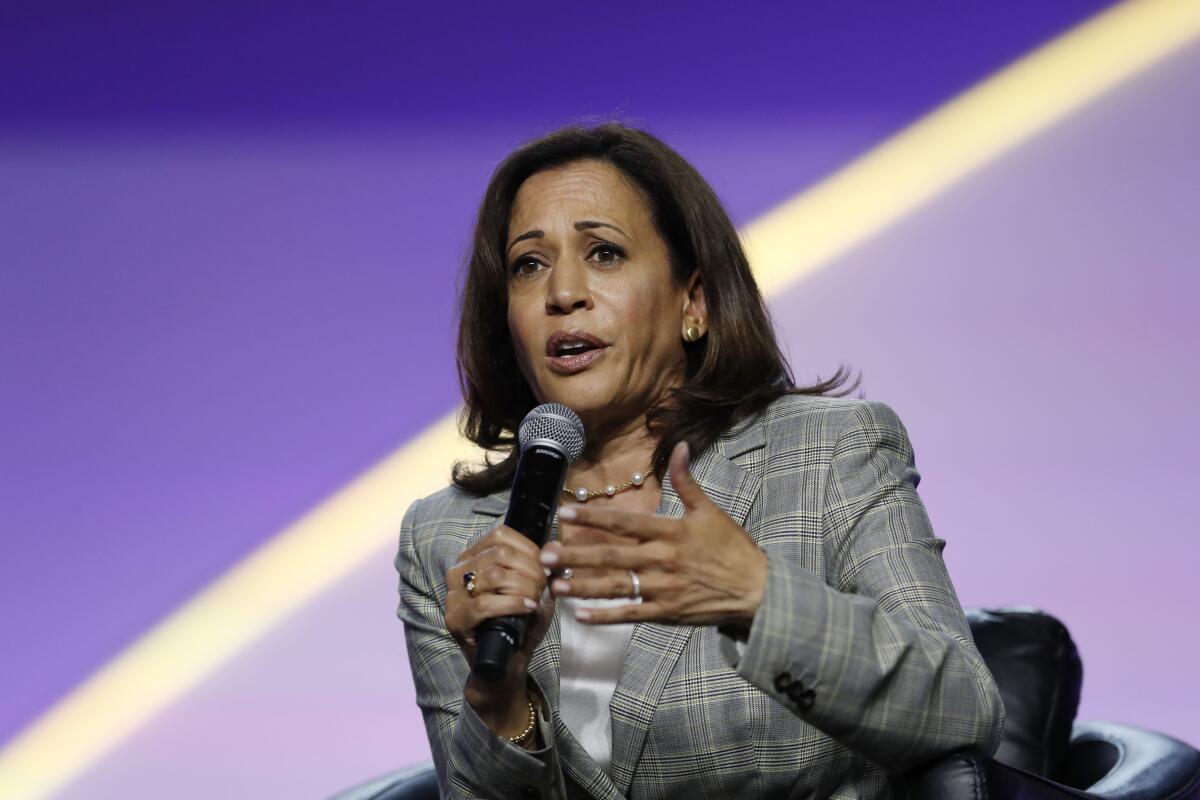Kamala Harris’ ‘Medicare for all’ plan includes a role for private health insurance

- Share via
Sen. Kamala Harris released her own version of a “Medicare for all” plan on Monday that imposes a tax on Wall Street instead of on middle-class households and tightly regulates, but does not abolish, private insurance plans.
The proposal offers the most detailed look yet on how the California senator, who has struggled at times to articulate her healthcare stances, would balance the competing demands within the Democratic party: promoting a sweeping government overhaul that has became a rallying cry of progressives while assuaging wary centrists by giving people an option of plans to choose.
“She offers something that gets us to universal coverage without being so constrained to one way of doing it,” said Dr. Kavita Patel, a Brookings Institution fellow and former healthcare advisor in the Obama administration who is not affiliated with the Harris campaign.
But the balancing act could also open Harris up to criticism from the left and right. Forceful single-payer advocates such as Sen. Bernie Sanders are averse to participation from corporate health insurers, while moderates like former Vice President Joe Biden have warned that Medicare for all would be too disruptive, particularly for the many Americans who get healthcare through their employers.
The debate among Democratic contenders has become increasingly contentious in recent weeks, with Biden — who favors focusing on expanding the Affordable Care Act without thoroughly revamping the healthcare delivery system — attacking Medicare for all as too expensive and radical.
Harris, in unveiling her version of Medicare for all, said she wants to address what she called a “crisis point” in the nation’s healthcare system.
“Big corporations are still putting profits over people’s well-being, and Republicans are determined to destroy what progress we have made and put those same corporations back in charge of the system,” Harris wrote in a blog post. “The next Democratic president needs a clear, transformative, and achievable vision of how we finally change this broken system for good.”
Harris, an early endorser of Sanders’ Medicare for all proposal, keeps many of the same elements of the Vermont senator’s plan. All medically necessary services, such as doctor visits, hospital stays, and vision and dental care, would be included in the plan with no deductibles and strict limits on out-of-pocket costs. The proposal, like Sanders’, would allow the government to negotiate prescription drug prices with pharmaceutical companies in order to curb rising medication costs.
But Harris outlined a longer transition time — 10 years — to implement the new program, gradually incorporating newborns and uninsured people through automatic enrollment and giving others more time to move to the government-run plan.
Sabrina Corlette, research professor at the Georgetown Center on Health Insurance Reforms, praised the extended time as “very pragmatic.”
“Any time you’re going to try to get that much change in the healthcare system, it does require a long lead time,” Corlette said.
The proposal offers new clarity on the role of private insurers, which Harris had been muddled about in the past. Unlike Sanders, who would curtail their participation almost entirely, Harris would allow corporate plans to offer competing Medicare plans, modeled on the Medicare Advantage plans available for older Americans now. Those plans would have to adhere to government-set requirements on benefits and costs to ensure access and limit insurer profits.
Sanders and Harris have both proposed a number of ways to pay for the program, including higher taxes on the top 1% of earners and taxing capital gains as ordinary income. Sanders would increase taxes on the middle class through a 4% income premium on families earning $29,000 and higher.
Harris would limit those tax hikes to those making $100,000 or more. Instead of taxing lower-income families, she would impose a fee on Wall Street transactions and make other changes to the corporate tax rate.
“The commitment to asking the wealthy and corporations to pay their fair share before we start going down the income spectrum — that’s really admirable,” said Michael Linden, a tax expert and fellow at the Roosevelt Institute. “After the last 40 years of rising income inequality, that’s really where the money is.”
Biden said the notion of imposing Medicare for all without raising taxes on the middle class is a “fantasy world.” Sanders has also said that higher taxes will be necessary, noting in a CNN interview on Sunday that “obviously, healthcare is not free” and that Americans will pay less overall under his proposal because it would do away with out-of-pocket healthcare expenses.
For those who get healthcare through an employer, the main way working-age Americans get coverage, Harris’ proposal would let companies keep their plans during the 10-year transition. After that, employers could participate in the government-run Medicare plan or offer their workers a private plan certified by Medicare.
“It is still upsetting the apple cart with regard to the system we’ve had for generations,” Corlette said. “For folks who are more on the moderate to conservative side, she’s still going to be open to that line of attack that this is a government-run system, and it’s going to be taking coverage away from people who are, for the most part, happy with employer-based coverage.”
More to Read
Get the L.A. Times Politics newsletter
Deeply reported insights into legislation, politics and policy from Sacramento, Washington and beyond. In your inbox three times per week.
You may occasionally receive promotional content from the Los Angeles Times.











